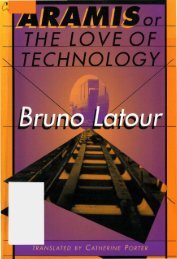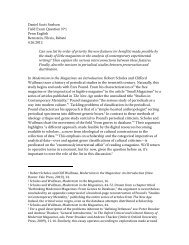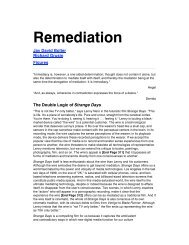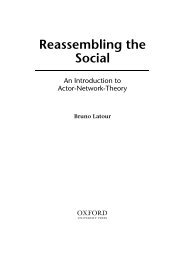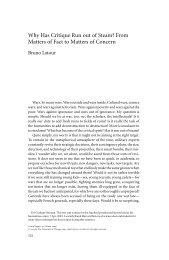The Exploit: A Theory of Networks - asounder
The Exploit: A Theory of Networks - asounder
The Exploit: A Theory of Networks - asounder
You also want an ePaper? Increase the reach of your titles
YUMPU automatically turns print PDFs into web optimized ePapers that Google loves.
Edges 109<br />
control it seeks to establish. It is the point where control and transformation<br />
intersect. Which brings us to an ending in the form <strong>of</strong> a<br />
question: is there a certain “carelessness” to curare?<br />
Sovereignty and Biology I<br />
Political thought has long used the body as a metaphor for political<br />
organization. Plato analogizes the political order <strong>of</strong> the polis with the<br />
biological order <strong>of</strong> the body and in doing so medicalizes politics. After<br />
having spent the majority <strong>of</strong> the work discussing the constitution <strong>of</strong><br />
a just political order, the Republic turns to the forces <strong>of</strong> dissolution or<br />
decomposition that threaten the body politic. Primary among these is<br />
the descent from concerns <strong>of</strong> justice to concerns <strong>of</strong> wealth (oligarchy)<br />
and concerns <strong>of</strong> appetites (democracy). Though economic health and<br />
basic necessities are central to the proper functioning <strong>of</strong> the polis, it is<br />
their excess that creates the “illness <strong>of</strong> a city.” 5 For Plato, if oligarchy<br />
represents the excessive rule <strong>of</strong> wealth for its own sake, then democracy,<br />
in his terms, represents the imbalance between desire and freedom,<br />
in which freedom is always the legitimation for desire. <strong>The</strong> combination<br />
<strong>of</strong> the two results in the diseased body politic: “When [oligarchy<br />
and democracy] come into being in any regime, they cause trouble, like<br />
phlegm and bile in a body. And it’s against them that the good doctor<br />
and lawgiver <strong>of</strong> a city, no less than a wise beekeeper, must take long -<br />
range precautions, preferably that they not come into being, but if they<br />
do come into being, that they be cut out as quickly as possible, cells<br />
and all.” 6 This same logic—a kind <strong>of</strong> medical sovereignty—is played<br />
out in mechanistic terms in Hobbes’s De Corpore Politico, and in organicist<br />
terms in chapters 13 to 20 <strong>of</strong> Rouss eau’s <strong>The</strong> Social Contract.<br />
In the current era <strong>of</strong> genetics and informatics, has the concept <strong>of</strong> the<br />
body politic changed? If the understanding <strong>of</strong> the body changes, does<br />
this also require a change in the understanding <strong>of</strong> the body politic?<br />
Sovereignty and Biology II<br />
In one <strong>of</strong> his lectures at the Collège de France, Foucault suggests that<br />
contemporary analyses <strong>of</strong> power need to develop alternative models to<br />
the tradition <strong>of</strong> juridical sovereignty: “In short, we have to abandon



